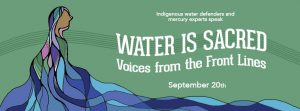Water is Sacred: Voices from the Front Lines
Come hear Indigenous water defenders and mercury experts speak
Judy Da Silva, Grassy Narrows
Vanessa Gray, Aamjiwnaang
Waawaate Fobister, Grassy Narrows
Dr. Hanada, Open Research Centre for Minamata Studies, Japan
Tuesday September 20, 2016 at 6:30pm
University of Toronto, Room 1101 Sanford Fleming Building. 10 King’s College Road
Water is sacred. It is a human right, but more importantly it is that which sustains all life on this planet, both human and non-human. Canada is one of the most water-rich countries in the world, yet over 100 Indigenous nations across the country are forced to live with water that is unclean, inaccessible, and sometimes toxic. This is not an unfortunate coincidence, but part of a long history of environmental racism against Indigenous peoples by the Canadian government.
However, these unacceptable conditions are only half the story. Indigenous communities everywhere are fighting for access to clean water, to protect it from industries and the corporations that poison it, and ultimately to re-affirm the principle that water is sacred.
Grassy Narrows and Aamjiwnaang First Nations are at the forefront of these struggles and are truly inspiring in their work. Dr. Hanada is an expert and long time collaborator with Grassy Narrows. Join us on September 20th to hear the stories of resilience and resistance from three inspiring Indigenous defenders fighting for clean water, government and corporate accountability, and Indigenous sovereignty. We are humbled to be able to have Judy Da Silva, Vanessa Gray, and Waawaate Fobister speak together about their experiences fighting to protect their communities’ water.
Judy Da Silva is a grandmother and land defender from Asubpeeschoseewagong (Grassy Narrows). She was one of the forty people from Grassy Narrows who came to Toronto in June to lead the River Run, to demand a mercury clean up of the English-Wabigoon river. Her five children give her strength.
Vanessa Gray is a 24 year-old Anishinaabe kwe from the Aamjiwnaang First Nation, located in Canada’s Chemical Valley. Vanessa has been working with community members to bring awareness to the health issues resulting from her reserve’s toxic surroundings. She is an organizer with ASAP, Aamjiwnaang and Sarnia Against Pipelines.
Waawaate Fobister is a groundbreaking young playwright and actor from Grassy Narrows. His work touches on being two spirited growing up in and around Grassy Narrows, and on escaping the legacy of residential schools. He is also an advocate for mercury justice.
One of the founders of the Open Research Centre for Minamata Studies, Dr. Masanori Hanada (Dean of Social Welfare & Policy, Minamata Studies, Kumamoto Gakuen Univ.), is co-author with and long-time colleague of the late Dr. Masazumi Harada* of many reports on Minamata disease and has worked on pollution issues internationally for over 30 years. He has been the organizer of the follow up research trips to Wabaseemoong Independent Nations of One Man Lake, Swan Lake and Whitedog and Asubpeeschoseewagong Netum Anishinabek (Grassy Narrows First Nation) since 2004. [* often confused in the West because of the similarity of their names]
There will be tote bags for sale, and the proceeds will go directly to supporting these speakers’ struggles to clean and protect their communities’ water.
Free event. Donations are welcome.
ASL interpretation will be provided. The venue is barrier-free. Contact us if you have questions or specific needs.
Snacks will be available, including vegan and gluten free options.
Children are welcome. Kids activities will be organized very nearby with two helpers. Please contact us if you want to talk to them in advance.
TTC tokens will be available at the event.
https://www.facebook.com/event
FreeGrassy.net // #FreeGrassy
Supported by OPIRG-Toronto & Rising Tide Toronto
See Facebook page or email us for more information about accessibility.





